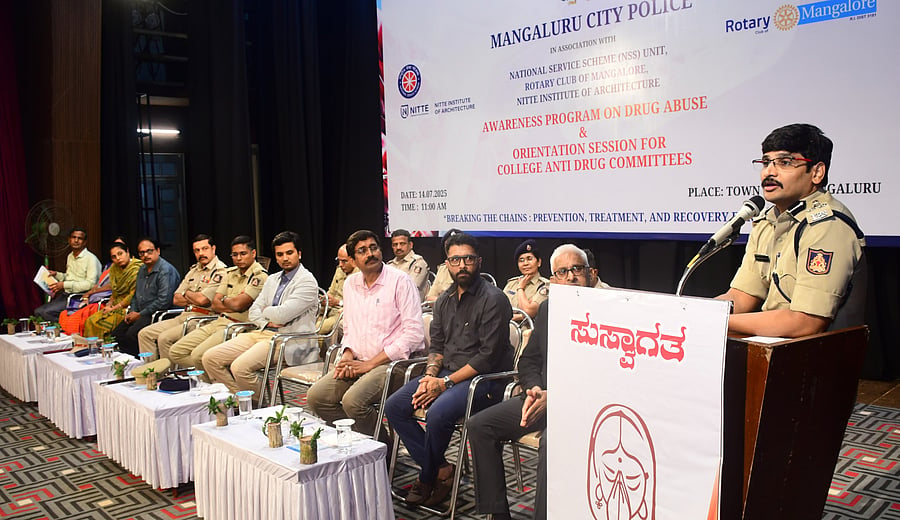
Commissioner of Police Sudheer Kumar Reddy C H speaks during drug abuse awareness and orientation programme for college anti-drug committees, at Town Hall in Mangaluru.
Credit: DH Photo
Mangaluru: Dakshina Kannada Superintendent of Police Dr Arun K has suggested making students and parents sign a voluntary undertaking for random screening for drug consumption in campuses during the admission.
Speaking at a drug abuse awareness and orientation programme for college anti-drug committees on Monday, organised by Mangaluru City Police, Rotary Club Mangalore, and the NSS unit of Nitte Institute of Architecture, Dr Arun said, “Just like anti-ragging undertakings, colleges can implement a similar process for drug screening.” He emphasised that campuses must adopt a strict zero-tolerance approach to drugs.
He noted that the University Grants Commission (UGC) has issued circulars to all universities outlining measures to curb drug abuse. “A dedicated chapter on drug abuse and illicit trafficking should be included in the syllabus, and the police will advocate for its implementation,” he added.
He urged educational institutions not to ignore the reality of drug and substance abuse on campus. “If a college hides such incidents, it only contributes to the worsening of the drug menace. Any case of drug abuse should be promptly reported to the police. If college-level counselling fails, professional help should be sought.”
Commissioner of Police Sudheer Kumar Reddy C H revealed that of 150 colleges, 107 have formed anti-drug committees. However, students from 80 colleges have already been booked for drug consumption. “If colleges fail to act despite clear guidelines and SOPs, the police will be forced to intervene,” he warned.
“We want to give drug abuse victims a chance to reform. But if they continue, we won’t hesitate to take legal action. Anti-drug committees must work proactively to keep campuses drug-free,” he said. He also urged institutions to identify vulnerable students, involve all stakeholders, and conduct mandatory random screenings. “DSPs and ACPs will act as nodal officers. When students report drug use through QR codes, they must provide names to enable swift action.”
Deputy Commissioner Darshan H V echoed the urgency, calling for the formation of anti-drug committees in all institutions within a month, alongside proactive preventive efforts.
Dr Srinivas Bhat from KS Hegde Hospital explained that drug abuse alters brain function and often leads to criminal behaviour.
Nitte Institute of Architecture Director Dr Vinod Aranha and others were present.
Drugs shattered my dreams
Guruprasad, founder of the Born Again Recovery Centre said “Due to a wrong choice, I fell into addiction and struggled to recover. Despite hardships, my parents enrolled me in college, hoping for a better future. But drugs destroyed that hope. Even today, I suffer from health issues.”
“I couldn’t complete my education. I lost my golden years. A close friend of mine — once a proud NCC cadet — died by suicide after getting addicted. Students must say no to drugs and stay focused on their dreams.”